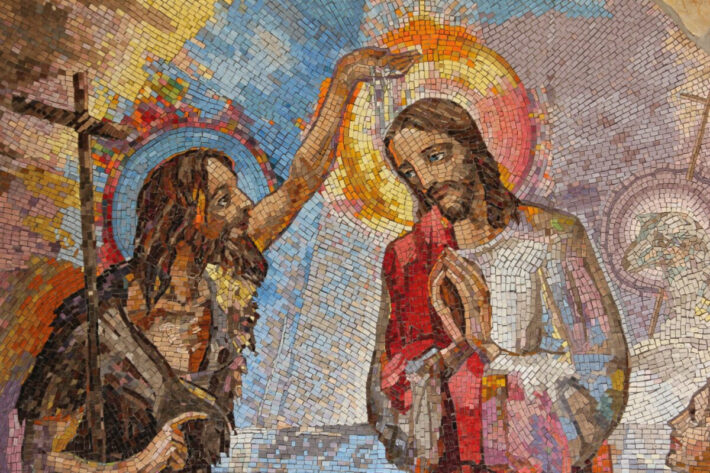On Wednesday, His Grace’s theme is baptism. He says:
‘I’d like to say that, in order to grasp something of the full initial impact of Christian baptism, it’s quite important for us to set aside the passages we have in the Gospels of Jesus’s life before he came to John to be baptized, and so this includes what are referred to as the infancy narratives, in the Gospels of Matthew and of Luke. I think to get the full impact, of just how it might have been, we need to set these later Gospels aside and go all the way back to Mark. I think this is something of the closest echo we’ll get to those first Christian communities who experienced baptism, and how it might have been, as the first Christians discovered Jesus.
‘This is how it happens, this is how it begins: in adulthood. The Gospel tells us:
‘“In those days, Jesus came from Nazareth of Galilee, and he was baptized by John in the Jordan. And just as he was coming up out of the water, he saw the heavens torn apart and the Spirit descending like a dove on him.”
‘Mark’s, without a shadow of a doubt, is the earliest Gospel that has been given to us. The story is only just getting going. There’s no Angel Gabriel. There are no infancy narratives. Mary is unnamed in Mark 3 when she comes, as she sees it, to have a go at rescuing Jesus. The beginning is John the Baptist. It begins in baptism.’
The impression clearly formed is that the Archbishop’s ideas are not mere bookish speculation but, as it were, bucket-and-spade, in the sense of his having visited the place where he thinks it was that Jesus was baptized. He tells us about the place, in the Holy Land, over the Jordan, where there is a confluence, troubled waters, and danger in entering into them. The picture he evokes of broiling surge, plunging deep, a GPS map-point, a trial in ways apart from our sacrament. Where waters churn and threaten to swallow you. And he is convinced it happened there. He is convinced. He relates it to our own baptism:
‘We all know the scene, don’t we? It’s a part of our lives – of who we are as Christians. With the sprinkling of water, and the oil, and the candle. The take-it-for-granted things of Christian life. And that little gathering of people clustered about the font, at the entrance into the church, our first steps, when we have to be carried by others, who all our lives will nurture us, toward the liturgical east of the sanctuary, all of them trying to remember their lines right, who perhaps don’t get to church that often. It’s a very beautiful part of our lives as Christians, where we welcome a new child into our community of faith in Jesus.’
![]()
![]()
![]()
![]()








